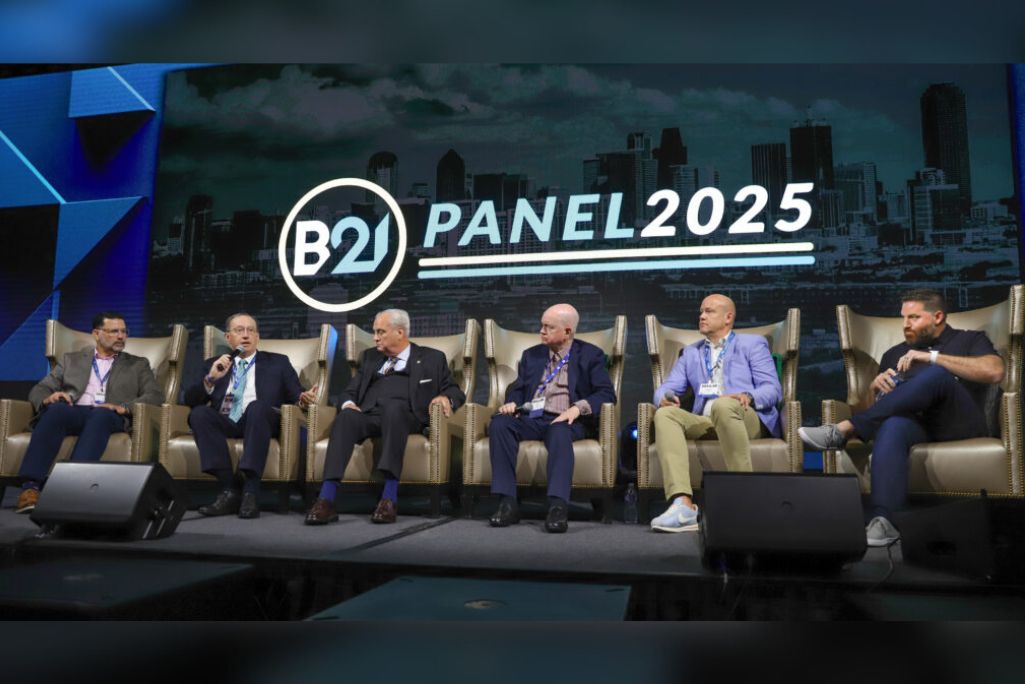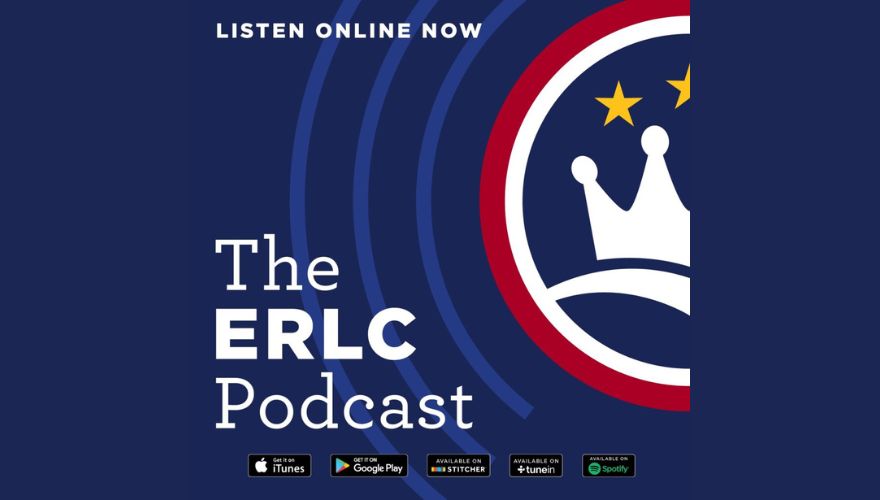
(Left to right) Juan Sanchez, Jeff Iorg, Albert Mohler, Danny Akin, Jimmy Scroggins and Nate Akin.
DALLAS (BP) — The Law Amendment, abolishing the Ethics & Religious Liberty Commission (ERLC) and a proposed revision to the Southern Baptist Convention’s (SBC) Business and Financial Plan were among topics of discussion at a June 10 panel discussion hosted by the group Baptist 21.
The panel at the Omni Hotel in Dallas featured Juan Sanchez, pastor of High Pointe Baptist Church in Austin, Texas; Jeff Iorg, president of the SBC Executive Committee; Albert Mohler, president of Southern Baptist Theological Seminary; Danny Akin, president of Southeastern Baptist Theological Seminary; and Jimmy Scroggins, pastor of Family Church in West Palm Beach, Fla.
Sanchez said the SBC Constitution should be amended to define cooperating churches exclusively as those which appoint or approve only men as pastors. Cultural pressures urging compromise of biblical standards on gender and sexuality demand that Southern Baptists take a firm stand, he said. Sanchez took issue with those who argue pastor is a spiritual gift that women can possess and not merely an office.
In the Tuesday morning session of the SBC annual meeting, Sanchez moved that a church in friendly cooperation be defined as one which “affirms, appoints or employs only men as any kind of pastor or elder as qualified by Scripture.” A previous version of the proposal supported by Sanchez and Virginia pastor Mike Law — for whom the amendment came to be named — failed in 2024 to receive the second of two required two-thirds votes. Sanchez’s motion this year called for reconsideration of the issue.
“My aim is persuasion,” Sanchez said. “Let’s talk about this. Let’s clarify who we are and what we believe.”
Akin said he supported the Law Amendment last year and now is “adamant” about the need for it. “We have thrown around the term pastor willy-nilly when the Scripture is clear a pastor is an elder is an overseer. If you don’t meet the qualifications of an elder, you ought not to be called a pastor.”
Iorg agreed with other panelists that Scripture precludes women from serving as pastors, but he opposed the Law Amendment — a position he took last year as well. Adopting the amendment would shift the issue of female pastors from being a doctrinal belief to being a legal matter codified in the convention’s constitution, he said. Iorg warned that could increase the SBC’s legal liability.
“If the amendment passes, it may be helpful to Southern Baptists in the long run,” Iorg said. “I don’t know. But I know it will be expensive.”
Panelists also addressed a June 10 motion by Florida pastor Willie Rice to abolish the ERLC. Mohler said he stood by his view, expressed in a May B21 podcast, that the ERLC may no longer be useful in Southern Baptist life.
Scroggins said some advocates of abolishing the ERLC may undervalue institutions and how long they take to build. “We can have all kinds of complaints about leadership or (the ERLC’s) effectiveness or the lack thereof. We can have qualms with who the leaders have been.” Yet “we ought to be very careful about making the decision to actually end an institution.”
A better path, Scroggins said, is to use the SBC’s trustee system to effect changes at the ERLC.
Sanchez, who served as an ERLC trustee, said the commission’s advocacy of the SBC’s ethical stands in Washington has been an important ministry. “We’re going to want people to do those things.”
Controversy has arisen surrounding the ERLC in recent years, Sanchez said, because it “has spoken into things where Southern Baptists are not united.”
Financial accountability at SBC entities was another discussion focus for the panel. Iorg advocated a revision of the SBC Business and Financial Plan to be voted on by SBC messengers in Dallas.
“Southern Baptists demand transparency and rightly demand transparency at their entities,” Iorg said. “And that transparency is to the board of the trustees, not to the public. The board of trustees is supposed to know everything.” Calls to publish sensitive financial information publicly are “financial voyeurism,” Iorg said, and could harm the ministry of SBC entities.
Mohler underscored the sentiment.
“I think transparency is a very odd place to land. Integrity is the far more fundamental issue. What we want is integrity in our institutions,” Mohler said. The trustee system protects integrity even when public transparency is ill advised.
When they differed, panelists said the differences were friendly disagreements among brothers in Christ. None of the SBC’s present hot button issues should compromise cooperation, they said, because the lost world needs the SBC’s witness.
“Southern Baptists are a very diverse people,” Akin said. “But we have stood faithfully on what I call the three-legged stool for decades: theological education, North American church planting, international missions. We are not perfect, but we do those three things as well as anybody.”
(EDITOR’S NOTE — David Roach is a writer in Mobile, Ala.)


